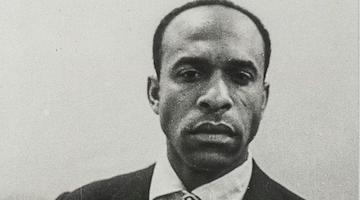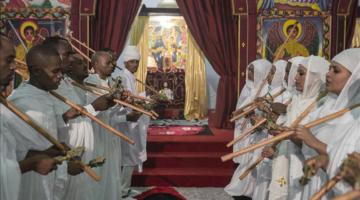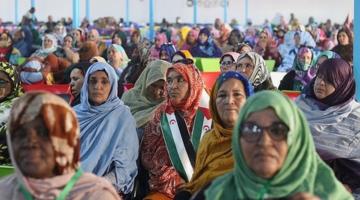“It is a lie that slavery has been abolished. It has only been modernized.”
Largely neglected in the English-speaking Black World, Senegal’s Lamine Senghor is an important figure in the history of early-twentieth-century Black anti-colonial agitation. Born on September 15, 1889, to a Seret peasant family in rural Joal, Senghor was radicalized by his humiliating encounters with French colonial authorities in Dakar, and by his experiences as a Black colonial soldier fighting for France during World War I.
By the mid-1920s, Senghor was living in France, organizing within the Communist Party with other French colonial subjects. His frustrations with the Party on race and colonial issues led him to found the Comité de défense de la race nègre, described as “the first Black association in France openly calling for African self-determination,” and later the Ligue de Defense de la Race Nègre, of which both George Padmore and Tiemoko Garan Kouyaté were affiliated.
Senghor attended the founding conference of the League Against Imperialism and Colonial Oppression, held in Brussels on February 10, 1927. His speech at the conference described in detail the brutality and rank hypocrisy of French colonial practice. Not only does Senghor show how France’s African subjects were mere fodder for the meat grinder of imperialism, but he argues that colonialism was in fact merely an extension of slavery. Senghor called for the end of colonial rule and demanded African self-determination. He understood that colonialism could not be reformed, and white rule could not be rectified.
French colonialism eventually killed Senghor. On November 25, 1927, Senghor died in France at age 38. His health had long been deteriorating as a result of surviving the German gas attack during the Battle of Verdun. Death was Senghor’s only “reward” for serving as a colonial soldier defending France.
A translation of Lamine Senghor’s speech to the League Against Imperialism conference in Brussels, given less than a year before his untimely passing, is reprinted below.
A Black Man’s Protest
Lamine Senghor
Ladies and gentlemen, and beloved comrades! I bring you the fraternal greetings, the hearty good-will, and a cry for freedom from the Defense Committee of the Negro Race [Comité de défense de la race nègre].
What is that Committee? It represents a world-wide organization of young Negroes who are devoting their lives to emancipating their brethren. You know that the black race has been the most oppressed of all the peoples of the earth. Over its members the world’s imperialists exercise the right of life and death. We are rallying our forces, nevertheless, to assert our equality with the races that pretend to be superior to us. We challenge that superiority.
Permit me to dwell a moment, by way of introduction, upon the world “colonization.” What does it mean? It means usurping the right of a nation to direct its own destinies. Any nation that is deprived of that right is, in the strict meaning of the word, a colony. The whites have come to us colored people professing to bring us civilization. When the French came to my countrymen in Africa it was with this profession on their lips. But instead of teaching us the French tongue, and giving us the education that they call “la lumière universal” they said: “Ah, no. We must n’t educate the blacks.” This was because, if we were educated, they couldn’t use us as they wished. That is the way French imperialists have civilized the Negroes. But let me make this point even more precise. I will quote to you some passages from a report made by a former colonial administrator of France and published in several newspapers of that country. It relates to typical colonial abuses.
“I accuse M. Hutin, who was at that time a colonel and is now a general and a commander of the Legion of Honor, of having ordered the looting of the trading station at Molenga and of having shared the loot.” A list of stolen articles follows—case of jam for his personal use, pictures, cartridges, a shotgun, a Browning, high-priced cloth, and so on. The author of the report continues: “I accuse the Assistant Chief of the post at Bania of having brought before him a chief of the Gana tribe, who refused to tell him where certain Mauser rifles, captured by his men from the German deserters, were hidden. He first caused the chief’s hand to be crushed in an iron copying press. He then had him flogged with lashes containing bits of steel, and, after honey had been rubbed upon his wounds, exposed him in the sun to be stung by bees.”
Who is there that does not shudder with horror at the thought that Frenchmen in the twentieth century still commit atrocities that would shame the worst barbarism of the Middle Ages? A recent decree of the Governor-General of French West Africa provides that the natives shall be compelled to labour upon works necessary for the public welfare whenever the Government so orders. Official regulations prescribe the conditions under which such labor shall be performed. Article 3 says: “The working day shall be ten hours, plus two hours for rest.” Article 9 provides: “The minimum daily pay of each worker shall be as follows: women and children, one and one-half francs; adults, two francs.” This labor is compulsory. The people are forced to toil ten hours a day under the burning sun of Africa for two francs. The women and children work the same number of hours as the men. Yet they tell us that slavery has been abolished, that the Negroes are free, that men are equal. People who say that are imbeciles.
It is true act you can no longer sell a Negro to a white man or a Chinamen [sic] or even to another Negro. But it is a familiar sight to see one imperialist Power sell a whole Negro nation to another imperialist Power. What did France actually do with the Congo in 1912? She simply turned a great territory there over to Germany. Did she ask the people of the country if they wanted to belong to the Germans? Some French politicians write in their press that their West Indian Negroes are beginning to demand too many privileges and that it would be better to see them to America and get something out of them. It is a lie that slavery has been abolished. It has only been modernized.
You saw during the war how every Negro who could be caught was put into the army, to be taken away and killed. So many were forced to serve that the French governors in Africa began to protest, fearing that the natives would rebel. But since cannon fodder must be had any cost, France found a tractable negro, heaped honors upon him, called him “commissioner-general representing the French Republic in Africa,” gave him an escort of French officers and of Negroes decked out in gorgeous uniforms, and sent him back to his native land. There he was received with the most exalted honors. French administrators and colonial governors greeted him, soldiers presented arms to him. So this Negro managed to get eighty thousand more men to add to the half-million already fighting in France.
My fellow countrymen were led off to slaughter during the first Morocco war. Later, during the World War, they were again forced to serve. Even to-day they are being killed in Morocco and Syria. They have been sent to Madagascar. They have very recently been dispatched to Indo-China, because that country borders on China, and revolution is abroad across the border.
Ah, you Chinamen [sic] among my auditors here, I embrace you as comrades. You are setting a grand example of revolt for all the oppressed peoples. I only hope that they will catch the inspiration from you.
French imperialists, I say, have sent Negro troops to Indo-China to shoot down the natives of that country in case they rebel against French oppression. They tell these troops that they are of a different race from the people whom they are ordered to kill, in case the latter venture to revolt against their so-called “Mother Country.” Comrades, the Negro race has slept too long. But beware; they who have slept long and soundly, when they once awaken, will not fall asleep again.
Now let us see how this “Mother Country” rewards the services of the black soldiers who have been wounded in her defense, the men who have been crippled by the bullets of pretended enemies and can no longer labor to support themselves. They are treated very differently from the French wounded who fought shoulder to shoulder with them on the battlefield, and in defense, as we are told, of the same “Mother Country.” I will cite to you only two examples. Here is a wounded French soldier, graded with ninety-per-cent disability—that is, in the second class. He has one child. The French Government grants him a pension of 6888 francs a year. Here, on the other hand, is a Negro soldier of the same class, married, the father of one child, wounded in the same way, wounded in the same army, also graded with ninety-per-cent disability. He receives 1620 francs. Then take a war cripple with one-hundred-per-cent disability. That is to say, he cannot move himself; he must be carried wherever he goes. If he is a white Frenchman he receives 15,390 francs a year; if he is a Negro he gets only 1800 francs.
Comrades, it is against such injustices, such atrocities as I have just described, that we have organized to defend ourselves. Our young Negroes now have their eyes open. We have been shown that, when we are needed to be slaughtered or to perform heavy labor, we are Frenchmen. But when it comes to giving us our rights, we are no longer Frenchmen—we are Negroes.
Lamine Senghor, “A Black Man’s Protest," The Living Age, 332:4306 (15 May 1927), 866–8, translation of a speech that appeared in L’Independance Belge March 24, 1927.



















